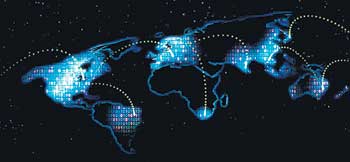
Imagination revolutionThe technological revolution is over! I know that's a pretty bold statement for a small weekly technology columnist to make, but the next technological revolution will not happen until we invent cars that run on air (considering that in many countries around the world, a litre of bottled water is already more expensive than a litre of petrol, cars that run on water are not going to be a good idea), learn to travel through time, and discover how to "end the war in six months." The point I am trying to make is that we are no longer limited by the availability of technology. We either have, or know how to develop technological solutions to most of the problems that we face as individuals, nations and as a species. We already have the technology for example, to travel to mars or to clone a deputy minister for Labour - they have not been done because of non-technological constrains, unjustifiable costs and shear uselessness. What limits us is the absence of an 'Imagination Revolution.'The phrase "you are only limited by your imagination" had become a cliché well before it's time. Today, the global economy cannot sustain the population on trade and agriculture alone and fittingly, knowledge-based services constitute a significant portion of economic activity. Owing to the importance of information exchange and management, the modern definition of knowledge was based on a person's technological proficiency and information skills. Developing nations such as Sri Lanka has been slow to expand our education system to provide Information Technology skills. The world however, is moving too fast for us to catch-up. Being proficient in the use of technology can no longer give us a competitive edge. What we need is a spark to set off the "Imagination Revolution." It is no longer enough that we 'know' - we have to be able to 'imagine.' - technopage@gmail.com Improve your computer literacy Uberveillance Uberveillance is a slang term used to describe an above and beyond, an exaggerated, an omnipresent 24/7 electronic surveillance. Not only does the term suggest a surveillance that is always on but also surveillance that is always with you, referring to a surveillance technology that is embedded within the human body (e.g. Big Brother on the inside, looking out). May also be seen written as Überveillance. Cyberveillance Cyberveillance is a slang term normally used to describe the combination of hardware and software tools used for surveillance in the workplace. Cyberveillance is the monitoring of employee's computer activity. This refers to both on and off-line activity monitoring where managers are able to watch file changes on the system, the Web sites visited by the employee, instant messages, e-mails, and literally every keystroke made Private Cell A router announced this week by Agito Networks is designed to help companies with wireless local-area networks (WLANs) save money on mobile phone calls. Agito is shipping the RoamAnywhere Mobility Router, a fixed-mobile convergence appliance available in two models. It routes calls from mobile phones on to a private WLAN, using the Institute of Electrical and Electronics Engineers (IEEE) 802.11 standard, also known as Wi-Fi, to connect to users wireless handsets. This way, employees who use their mobile phones at the office for example, could have their calls routed through voice over wireless LAN (VoWLAN), if they have Wi-Fi coverage. If a worker makes a call over the cellular network and then moves to within range of the Wi-Fi network, the call would be handed over without making the caller hang up and then call again.
Agito says RoamAnywhere works with handsets from all GSM and CDMA carriers. It works on Windows Mobile 6 devices, plus seven different E and N-series handsets from Nokia. Agito also plans to make it available for Research in Motion's BlackBerry smart phones, once an application programming interface is available, Roshan added. Agito claims the calls are handed over in less than a second, and the router uses radio-frequency location detection to determine where the handset is located. This in turn allows administrators or users to set up policies. Administrators can define rules, based on time zone, time of day, day of the week, date or a user's presence information. The rules can dictate that calls are routed to a user's mobile phone, desk phone or sent automatically to voicemail. Administrators can let users set their own rules, and the policies can be enforced either on the devices or the handsets. It is certified to operate with Internet Protocol private branch exchanges from Cisco Systems Inc. (Unified Call Manager 5.0 or higher), Ayava Inc. (Communications Manage 3.0 or higher) and from Nortel Networks. It also works with Microsoft's Office Communications Server. Anyone wanting to buy a product like RoamAnywhere should make sure their Wi-Fi network will support voice. |
|
||||||
|| Front
Page | News | Editorial | Columns | Sports | Plus | Financial
Times | International | Mirror | TV
Times | Funday
Times || |
| |
Reproduction of articles permitted when used without any alterations to contents and a link to the source page.
|
© Copyright
2008 | Wijeya
Newspapers Ltd.Colombo. Sri Lanka. All Rights Reserved. |
